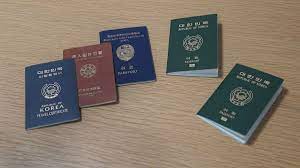Attention all Korean citizens planning a trip to the captivating land of Vietnam! Are you ready to embark on an unforgettable adventure, but feeling overwhelmed by the visa process? Fret not, because we’ve got you covered! In this comprehensive guide, we will unravel everything you need to know about obtaining your Vietnam visa hassle-free. From essential requirements and application procedures to handy tips and tricks for a seamless experience, let us be your trusted companion in navigating through this exciting journey. So buckle up and get ready to explore the vibrant streets of Hanoi, cruise along the breathtaking Halong Bay, or bask in the serenity of ancient temples in Hue – with our help, your dream Vietnamese getaway is just a few steps away! VIETNAM VISA FOR KOREAN CITIZENS
Introduction to Vietnam Visa for Korean Citizens
Vietnam is a beautiful and popular tourist destination among Korean citizens, with its stunning natural landscapes, rich history, and vibrant culture. However, before planning your trip to Vietnam, it is essential to understand the visa requirements for Korean citizens. This article will provide you with a comprehensive guide on everything you need to know about obtaining a Vietnam visa as a Korean citizen.
Types of Visas for Korean Citizens
There are two main types of visas that Korean citizens can apply for when traveling to Vietnam: the e-visa and the traditional visa
- E-Visa:
The e-visa system was introduced by the Vietnamese government in 2017 to simplify the visa application process for tourists. It allows travelers from 80 countries, including South Korea, to apply for their visa online without having to visit an embassy or consulate.
To apply for an e-visa, Korean citizens need to fill out an online application form and pay the necessary fees. The processing time usually takes three working days, and once approved, the e-visa will be sent via email. It is valid for 30 days from the date of entry into Vietnam and allows single entry only.
- Traditional Visa:
Korean citizens can also apply for a traditional visa at any Vietnamese embassy or consulate in South Korea or other countries they may be residing in. This type of visa offers more flexibility as it allows multiple entries and longer stays in Vietnam. VIETNAM VISA FOR LATVIAN CITIZENS
The traditional visa requires applicants to submit their
Why Do Korean Citizens Need a Visa to Enter Vietnam?
There are a variety of reasons why Korean citizens need a visa to enter Vietnam. These reasons include diplomatic relations between the two countries, immigration policies, and national security concerns.
Firstly, it is important to understand the history of diplomatic relations between South Korea and Vietnam. The two countries established official diplomatic ties in 1992 and have since maintained friendly relations. However, like most countries around the world, they still require each other’s citizens to obtain a visa for entry.
Secondly, immigration policies also play a role in the visa requirement for Korean citizens entering Vietnam. Each country has their own set of rules and regulations when it comes to allowing foreign nationals into their borders. For Vietnam, obtaining a visa is seen as necessary for maintaining control over who enters the country and for what purpose. This helps prevent illegal immigration and ensures that visitors comply with the laws and regulations of Vietnam during their stay.
Furthermore, national security concerns also contribute to the need for Korean citizens to obtain a visa before entering Vietnam. As with any country, there are certain security measures in place to protect its citizens from potential threats or risks posed by foreigners. The Vietnamese government takes these measures seriously and requires all foreign nationals, including Korean citizens, to go through proper vetting processes before being granted entry into the country.
In addition to these overarching reasons, there are also specific requirements that must be met by Korean citizens in order to obtain a visa for travel to Vietnam. These may include having a valid passport with at least six months validity

